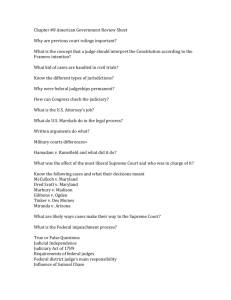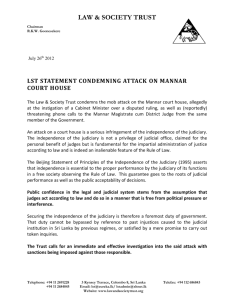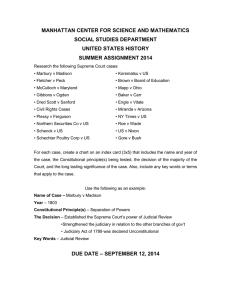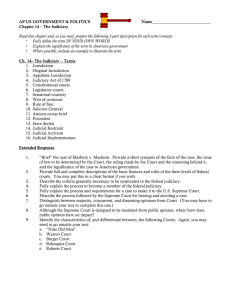Judicial Independence
advertisement
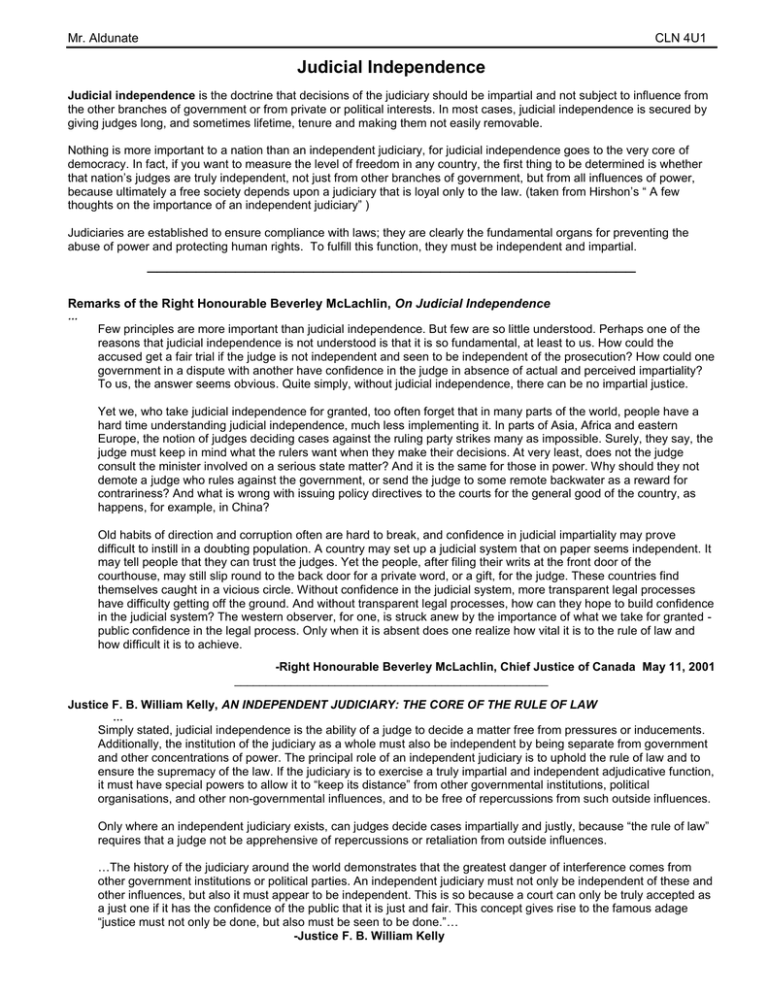
Mr. Aldunate CLN 4U1 Judicial Independence Judicial independence is the doctrine that decisions of the judiciary should be impartial and not subject to influence from the other branches of government or from private or political interests. In most cases, judicial independence is secured by giving judges long, and sometimes lifetime, tenure and making them not easily removable. Nothing is more important to a nation than an independent judiciary, for judicial independence goes to the very core of democracy. In fact, if you want to measure the level of freedom in any country, the first thing to be determined is whether that nation’s judges are truly independent, not just from other branches of government, but from all influences of power, because ultimately a free society depends upon a judiciary that is loyal only to the law. (taken from Hirshon’s “ A few thoughts on the importance of an independent judiciary” ) Judiciaries are established to ensure compliance with laws; they are clearly the fundamental organs for preventing the abuse of power and protecting human rights. To fulfill this function, they must be independent and impartial. __________________________________________________ Remarks of the Right Honourable Beverley McLachlin, On Judicial Independence … Few principles are more important than judicial independence. But few are so little understood. Perhaps one of the reasons that judicial independence is not understood is that it is so fundamental, at least to us. How could the accused get a fair trial if the judge is not independent and seen to be independent of the prosecution? How could one government in a dispute with another have confidence in the judge in absence of actual and perceived impartiality? To us, the answer seems obvious. Quite simply, without judicial independence, there can be no impartial justice. Yet we, who take judicial independence for granted, too often forget that in many parts of the world, people have a hard time understanding judicial independence, much less implementing it. In parts of Asia, Africa and eastern Europe, the notion of judges deciding cases against the ruling party strikes many as impossible. Surely, they say, the judge must keep in mind what the rulers want when they make their decisions. At very least, does not the judge consult the minister involved on a serious state matter? And it is the same for those in power. Why should they not demote a judge who rules against the government, or send the judge to some remote backwater as a reward for contrariness? And what is wrong with issuing policy directives to the courts for the general good of the country, as happens, for example, in China? Old habits of direction and corruption often are hard to break, and confidence in judicial impartiality may prove difficult to instill in a doubting population. A country may set up a judicial system that on paper seems independent. It may tell people that they can trust the judges. Yet the people, after filing their writs at the front door of the courthouse, may still slip round to the back door for a private word, or a gift, for the judge. These countries find themselves caught in a vicious circle. Without confidence in the judicial system, more transparent legal processes have difficulty getting off the ground. And without transparent legal processes, how can they hope to build confidence in the judicial system? The western observer, for one, is struck anew by the importance of what we take for granted public confidence in the legal process. Only when it is absent does one realize how vital it is to the rule of law and how difficult it is to achieve. -Right Honourable Beverley McLachlin, Chief Justice of Canada May 11, 2001 __________________________________________________ Justice F. B. William Kelly, AN INDEPENDENT JUDICIARY: THE CORE OF THE RULE OF LAW … Simply stated, judicial independence is the ability of a judge to decide a matter free from pressures or inducements. Additionally, the institution of the judiciary as a whole must also be independent by being separate from government and other concentrations of power. The principal role of an independent judiciary is to uphold the rule of law and to ensure the supremacy of the law. If the judiciary is to exercise a truly impartial and independent adjudicative function, it must have special powers to allow it to “keep its distance” from other governmental institutions, political organisations, and other non-governmental influences, and to be free of repercussions from such outside influences. Only where an independent judiciary exists, can judges decide cases impartially and justly, because “the rule of law” requires that a judge not be apprehensive of repercussions or retaliation from outside influences. …The history of the judiciary around the world demonstrates that the greatest danger of interference comes from other government institutions or political parties. An independent judiciary must not only be independent of these and other influences, but also it must appear to be independent. This is so because a court can only be truly accepted as a just one if it has the confidence of the public that it is just and fair. This concept gives rise to the famous adage “justice must not only be done, but also must be seen to be done.”… -Justice F. B. William Kelly
